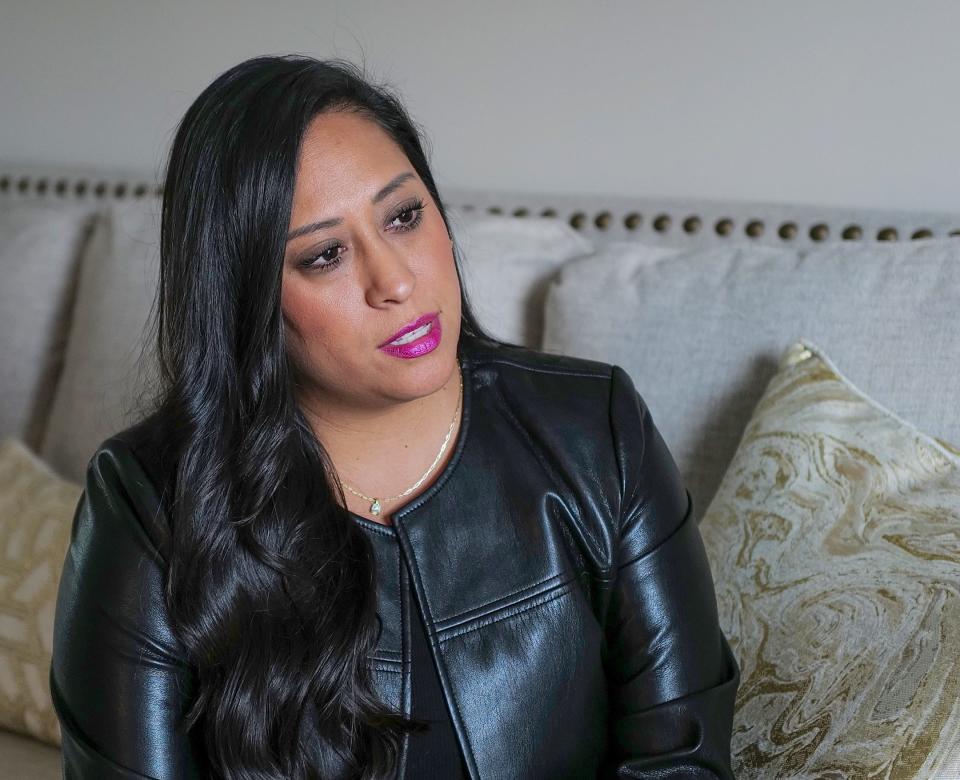Michigan denies claims from some Black crime victims at disproportionate rate

Corrections: The U.S. Department of Justice allocated $1,815,000 for compensation to the Michigan Department of Health and Human Services for its crime victim compensation program in 2021. A total of $4.94 million was paid out to 564 claimants and for 2,346 sexual assault forensic exams. And, the Safer Michigan Act goes into effect on Aug. 12. This information was incorrect in an earlier version of this story. Additionally, the MDHHS was not given an opportunity, prior to the publication, to respond to data that shows the department denied compensation claims to Black applicants at a higher rate than white applicants when behavioral issues were factored in. A statement from MDHHS addressing that finding has been added to this story.
LANSING — Michigan is one of multiple states that disproportionately denied claims from Black applicants to its crime victims compensation program because of "behavioral denials," according to an Associated Press analysis of data from across the U.S.
Michigan's program, in which crime victims can seek compensation for lost wages, medical bills, funerals and other expenses, is also widely underused, with the state ranked 40th out of 50 states and Washington D.C. for the 2021 fiscal year for most used compensation programs.
The state’s program did have denial rates on par with the race of applicants, at least across five racial groups, when behavioral issues were not a factor, the analysis showed. That put Michigan ahead of states such as Indiana, Georgia and South Dakota, where Black applicants were nearly twice as likely as white applicants to be denied.
In the 20 states that provided the AP data on the reasons for denial broken down by race, about 18% of white applicants were denied compensation for behavioral issues, compared to 33% of Black applicants, the Associated Press found.
The numbers were starker in Michigan, where about 23% of white applicants were denied compensation for behavior reasons, compared to 54% of Black applicants.
Michigan denies claims for behavioral issues if a person is criminally responsible, said Bob Wheaton, a spokesperson with the Michigan Department of Health and Human Services. That includes breaking into property, firing a weapon first and being injured, or assaulting someone and becoming injured, he wrote.
The AP gathered extensive racial data from 23 states from 2018-21 on people who sought help with medical expenses, funerals, crime scene cleanup or grief counseling after being the victim of a violent crime and who were denied. The analysis of that data found that Black victims and their families are disproportionately denied compensation in many states, often for subjective reasons that experts say are rooted in racial biases. From 2018 through 2021, the denials added up to thousands of Black families each year collectively missing out on millions of dollars in aid.
The news organization also found 51 disparate systems in the states and Washington D.C. that largely make their own rules on who gets denied and why. Oversight from the federal government is minimal — and in some states, the programs are dark little corners of larger departments that rarely get attention or scrutiny unless they fall short on funds, the AP said.
Wheaton declined to be interviewed for this story but issued statements via email.
"Michigan’s Crime Victim Compensation Program has been a lifeline for thousands of victims. Michigan’s approval and denial rate is roughly equal across racial categories. However, like many states, Michigan’s original statute was drafted over 30 years ago and incorporated elements that require staff to deny where the victim is criminally responsible, an accomplice or contributed to the crime," the department said in a statement.
"The Michigan Department of Health and Human Services (MDHHS) recognizes the existence of systemic racism and its impact on people of color. Providing equitable access to benefits is a top priority for MDHHS. The program is actively working to modernize its approach and re-evaluate existing practices.
"We are proud of our program in Michigan and especially our dedicated staff that have assisted tens of thousands of victims and survivors throughout the program’s history. We are committed to continually reviewing our processes and making improvements.
"We are looking forward to Aug. 12, 2023, when important statutory changes that were supported by our Division of Victim Services will go into effect that make the program even more accessible and meaningful to those we serve. DHHS is also implementing a web-based claims filing system that make filing claims easier for Michiganders and implementing a Navigator program to help victims gather the paperwork and information necessary to complete and process claims."
The AP analysis found that:
— State employees reviewing applications often base decisions on information from police reports and follow-up questionnaires that seek officers’ opinions of victims’ behavior — both of which may contain implicitly biased descriptions of events.
— Those same employees may be influenced by their own biases when reviewing events that led to victims’ injuries or deaths. Without realizing it, a review of the facts morphs into an assessment of victims’ perceived culpability.
— Many state guidelines were designed decades ago with biases that benefited victims who would make the best witnesses, disadvantaging those with criminal histories, unpaid fines or addictions, among others.
Michigan pays out about $4M each year
The U.S. Department of Justice allocated $1,815,000 for compensation to MDHHS for the program in 2021, one the highest out of all states and six territories. A total of $4.94 million was paid out to 564 claimants and for 2,346 sexual assault forensic exams, Wheaton wrote.
Wheaton said in a statement that the program is administered through the department's Division of Victim Services. The department received 683 applications last year for assistance, up slightly from 653 in 2021 and 649 in 2020, and seven employees work to assist victims. On average, he wrote, MDHHS paid out $3.98 million between fiscal years 2018 and 2022 for the program and for forensic exams for sexual assault.
Revenue, he added, is generated from post-conviction assessments of $130 per felony violation and $75 per misdemeanor or ordinance violation, and is matched by the federal government.
Change is coming: New Michigan laws in 2023: Service dogs, school safety and crime victim compensation
"The fund’s primary purpose is to support crime victim rights services required by the Crime Victim’s Rights Act and the Michigan Constitution, with excess funding directed to Crime Victim Compensation in Michigan," he wrote. "State funds spent on crime victim compensation are also eligible for federal matching funds that must be reinvested into crime victim compensation."
Michigan's application for compensation can be submitted via email, fax or by mail to MDHHS, according to application instructions, but the application can soon be submitted wholly online this summer because of a new law. The state health department has an online guide for victims on who qualifies for compensation.
In both fiscal years 2020 and 2021, MDHHS blamed the pandemic on how few applications it received, according to performance reports submitted to the DOJ. Still, the state denied nearly 33% of all applicants each year with 204 denials for 653 applicants in 2021.
Healing from a traumatic crime

Two years ago Quantel McKissic, 31, was wounded in a shooting that killed his cousin, Victor Clayborn, 27.
He suffered a gunshot wound, a torn ligament in his right shoulder and a puncture to his right ribs in the incident on Aug. 18, 2021, in the 800 block of Edgewood Boulevard in Lansing. He was forced to quit his catering job in order to heal from the wounds and loss of his cousin.
He applied to the crime victim compensation program and was denied due to what the department said were discrepancies in his application.
"It looks like a college application to a preschooler, but you wouldn't really understand it unless you had somebody next to you who's done it before," he said. "Or it has to be the person who created it because it's complicated."
He said he wasn’t emotionally prepared to handle a complicated questionnaire after he was diagnosed with post-traumatic stress disorder while healing from his injuries. He couldn't round up the required documents for the compensation application during that time.
"I have probably locked myself in the house for about a month just because of PTSD and stuff," McKissic said. "So a lot of the stuff they wanted me to do, I wasn't able to go get those and attain those."
From 2021: Police ID man, 27, killed in shooting Wednesday night in south Lansing
One of the criticisms of Michigan’s program is that victims have to report a crime to the police within 48 hours to be eligible
Detroiter Qiana Wembly was shot in 1997 while home from college in a case of "wrong place, wrong time" during a domestic dispute, she said. It placed her in the hospital for a week and she permanently lost sight in her right eye. She never applied for assistance, she said, because she didn't know the program existed. Michigan's fund has existed since 1989, according to the state Legislature.
"I was often traveling from Ann Arbor to Detroit several times a week just to go to my appointments and it was quite overwhelmingly expensive," she said. "And so I can imagine some support through victims' compensation would have really made my experience more tolerable at that time."
Rachel Carr-Shunk, a citizen of the Sault Ste. Marie Tribe of Chippewa Indians, called the 48-hour window for crimes to be reported to police "unrealistic," especially for Native Americans.
"We know historically that the access to justice for AI/AN victims is both complicated and limited in certain aspects (jurisdictional challenges)," she wrote. "The expectation that crime victims report their crimes immediately (in addition to requiring cooperation with the investigation) has impacts on communities and people that don’t have positive experiences with the criminal justice system."
She's the executive director of Uniting Three Fires Against Violence, a statewide tribal nonprofit organization focused on domestic violence and sexual assault survivors.
Since 2018, 53% of the 15 Native Americans who applied were denied, according to the AP's analysis. Less than 1% of the state's population is Native American, according to the U.S. Census Bureau.
Changes on the horizon for victims

Clayborn's family told the State Journal in 2021 that he made the best of any situation he was in and always helped out his family. Part of that included lending a hand to McKissic as he was trying to open Hank's Cuisine.
The restaurant, named after McKissic's dad Hank, will feature Southern and breakfast cuisines. Clayborn played a major role in remodeling the north Lansing property before his death, McKissic said. He said he had hoped that if he secured lost wages from the compensation program, he could focus on his business's summer grand opening.
He's able to reapply for compensation because current program requirements give him an extra year to reapply for benefits.
For others, change is on the horizon. Priscilla Bordayo, statewide manager of the Michigan chapter of Crime Survivors for Safety and Justice, said her organization and Alliance for Safety and Justice lobbied to pass House Bills 4674 and 4675, with bipartisan support, in the 2021-22 legislative session.
Effective Aug. 12, those needing help now and in the future have the benefit of the Safer Michigan Act, which provided several expansions to the compensation program.
House Bill 4674 expanded qualified victims to those who faced mental and emotional harm and their loved ones and household, and increased awards to cover relocation, bereavement and other expenses.
House Bill 4675 lengthened the 48-hour window victims have to report a crime to one year and victims can apply for compensation up to five years after reporting a crime instead of one year and mandated MDHHS to allow for the application to be submitted online.
"The funding is available," Bordayo said. "It's just a matter of how to remove those barriers. How do we give victims more time to heal so that they can focus on their healing?"
Once Hank's Cuisine opens, McKissic said there will be permanent tributes for his loved ones. His dad will be on the entry wall of the restaurant and desserts will be named after Clayborn. He hopes to step into an advocacy role for victims and survivors and to promote the health department's program.
"I plan on being the focal point for that when I do get it, just to show everybody we're not alone, we have help," he said.
The Associated Press contributed.
Support local journalism and get unlimited digital access! Subscribe for only $1 for three months!
Contact reporter Krystal Nurse at 517-267-1344 or knurse@lsj.com. Follow her on Twitter @KrystalRNurse.
This article originally appeared on Lansing State Journal: Michigan denies claims from Black crime victims at disproportionate rate

